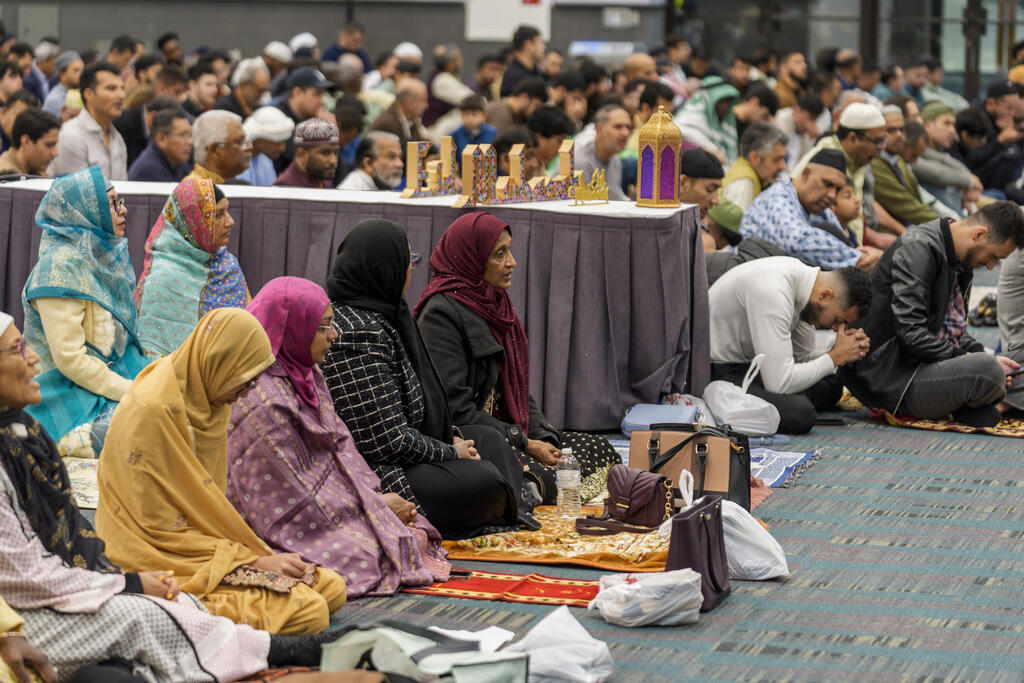Getting your Trinity Audio player ready...
Thirty-seven brand new television series are set to air across the Arab world, reaching hundreds of millions of homes, for the holy month of Ramadan (set to start on Friday night) — traditionally the peak season for television viewership.
I reviewed the content of each new series and found that, for the first time in years, not a single one focuses on Israel. There are no depictions of the horrors of war, no mention (so far) of Gaza, and not even the usual spy dramas about the "Zionist enemy." Unless I missed something, this could be, contrary to the norm, a Ramadan season without Israel appearing on the small screen. Of course, there is always the possibility of an unpleasant last-minute surprise.
3 View gallery


The Dome of the Rock in Jerusalem, ther e could be riots on the Temple Mount
(Photo: Jewel Samad / AFP)
Some series are fully produced with 30 episodes — one airing every evening and repeating the next afternoon — while others are limited to 15 episodes due to high production costs.
As Ramadan approaches, attention is focused on two key locations: first and foremost, Gaza, and right behind it, the Al-Aqsa Mosque in Jerusalem. Trouble could erupt in either place.
Israeli police have already distributed flyers urging Muslims to pray freely without interference, while security forces remain on high alert around the Temple Mount. It is easy to imagine the potential fallout if clashes break out between Israeli police and Muslim worshippers or if right-wing activists attempt to enter the site and disrupt the status quo.
Get the Ynetnews app on your smartphone: Google Play: https://bit.ly/4eJ37pE | Apple App Store: https://bit.ly/3ZL7iNv
My friends across the Arab world, whom I greet with "Ramadan Kareem," are convinced that the fasting month will not pass without tensions involving Israel. Israel, too, is preparing.
3 View gallery


Brig. Gen. Hisham Ibrahim, head of the Civil Administration meeting with representatives of several countries and international organizations operating in the West Bank
(Photo: IDF Spokesperson's Unit)
This will be a Ramadan without the traditional "Mawa'id al-Rahman" — the long communal tables set up in major cities for iftar, the evening meal breaking the fast. Turkish President Recep Tayyip Erdoğan has ordered their cancellation, redirecting food donations to Gaza instead. Jordan and Egypt are also sending truckloads of food and prepared meals to the enclave. Gulf states have pledged to supply Gazans with the colorful lanterns that symbolize Ramadan, along with new clothes and toys for children, following tradition.
Looking across the 22 Arab nations — some ruled by monarchs, others by presidents, and most by authoritarian regimes — this year's Ramadan will be marked by severe poverty. From Lebanon and Syria to Egypt, Jordan, Tunisia, Iraq, and beyond, economic hardship is widespread. Even Iran, the region’s largest state, is grappling with deep financial struggles.
Aside from the ruling elites, wealthy businesspeople and those with foreign incomes, the Arab world’s middle class has all but disappeared. In its place, two swelling social strata have emerged: the poor and, beneath them, the destitute. Those who barely managed to support their families last year have now lost their jobs. In Jordan, for instance, locals are forced to compete for work with migrants from Syria, Iraq, Lebanon and Egypt. In Egypt, many who once moved from villages to cities in search of better opportunities are now returning to their rural homes, where life is simpler and cheaper — though illiteracy rates remain high.
In Egypt, the Arab world's most populous nation, a new initiative called "Ahlan Ramadan" will launch for the first time. These markets will sell meat, poultry, flour, sugar, rice, fruits and vegetables at government-controlled prices, with discounts of 60% to 70%. Inspectors will patrol the stalls to ensure vendors do not overcharge.
 Smadar PerryPhoto: Yariv Katz
Smadar PerryPhoto: Yariv KatzTwo days before Ramadan begins, television and radio hosts across the Arab world are reminding viewers, from morning till night, not to overeat during the fast. Sound contradictory? Ask those who observe the fast yet gain at least three to four kilograms over the month.
Throughout the region, government offices are adjusting working hours, typically running from 9 a.m., after the pre-dawn meal, to 2 p.m. Streets become heavily congested as people rush home for iftar at 6 p.m. Afterward, families gather for the nightly television lineup — this year, it seems, without a single mention of Israel.


